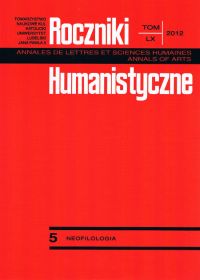Limitations on Involuntary-State Constructions in Polish: Between Structure and Semantics
Abstract
Involuntary State Constructions in Polish, formed with the clitic form się, are complex structures at the interface of the lexicon, morphology and syntax. Recently they have been analyzed in a most interesting way, where their properties are explained away with the use of the applicative structure, proposed a few years ago. In this paper we try to show that the uniformly structural analysis does not allow us to explain away all the limitations on the production of Involuntary State Constructions. We discuss the limitations concerning the one-argument predicates used in Involuntary State Constructions in the context of the control of such states by the human element. The irregular behavior of such verbs is explained with the use of re-analysis rules, which are lexical operations, not the syntactic ones, perhaps to be derivative from more general tendencies operating in the lexicon and connected with assigning thematic roles to arguments. Other limitations concern psychological predicates, whose behavior is also explained with the use of the same rules. We also consider the possibility of the existence of a split among psychological predicates, similar to a split proposed for Spanish. This split, together with the proposed syntactic structure, may explain why only the predicates that refer to continuing state may derive the Involuntary State Constructions.
References
Bresnan, Joan. 1981. Polyadicity: Part I of a theory of lexical rules and representations. In: Lexical Grammar, Hoekstra Teun, van der Hulst Harry and Michael Moortgat (eds.), 97-121. Foris: Dordrecht.
Bułat, Ewa. 2004. Reflexive verbs as null object licensers in Polish. Similarities between the Reflexive się and Small pro. Poznań Studies in Contrastive Linguistics 39: 29-38.
Cetnarowska, Bożena. 2000. The unergative/unaccusative split and the derivation of resultative adjectives in Polish. In: Tracy Holloway King and Irina A. Sekerina (eds.): Formal Approaches to Slavic Linguistics: The Philadelphia Meeting 1999, 78-96. Ann Arbor, MI: Michigan Slavic Publications
Cetnarowska, Bożena. 2002. Unaccusativity mismatches and unaccusativity diagnostics from derivational morphology. In: Paul Boucher and Marc Plénat (eds.) Many Morphologies, 48-81. Somerville, MA: Cascadilla Press.
Dziwirek, Katarzyna. 1994. Polish Subjects. Outstanding Dissertations in Linguistics. Jorge Hankamer (ed.), New York: Garland Publishing, Inc.
Kardela, Henryk. 1985. A Grammar of English and Polish Reflexives. Lublin: Uniwersytet Marii Curie-Skłodowskiej.
Kratzer, Angelika. 1996. Severing the external argument from its verb. In Phrase Structure and the Lexicon, Johan Rooryck and Laurie Zarig (eds.), 109-137. Dordrecht: Kluwer.
Levin, Beth and Malka Rappaport Hovav. 1995. At the Syntax-lexical Semantics Interface, Cambridge, Mass.: The MIT Press.
Laskowski, Roman. 1984. Kategorie morfologiczne języka polskiego – charakterystyka funkcjonalna [Morphological categories of the Polish language – functional characteristics]. In Morfologia [Morphology], Renata Grzegorczykowa, Roman Laskowski, and Henryk Wróbel (eds.), 121-163. Warszawa: PWN.
Malicka-Kleparska, Anna. 2012. Involuntary state constructions in Polish: a case of semantic- syntactic interface. In: Modules and Interfaces, Maria Bloch-Trojnar and Anna Bloch-Rozmej (eds.). Lublin: Wydawnictwo KUL.
Marín, Rafael and Louise McNally. 2011. Inchoativity, change of state, and telicity: evidence from Spanish reflexive psychological verbs. In: Natural Language and Linguistic Theory 29: 467-502.
Perlmutter, David M. and Paul M. Postal. 1984. The 1-Advancement Exclusiveness Law. In David M. Perlmutter and Carol Rosen Studies in Relational Grammar 2, 81-121. Chicago, Ill.: University of Chicago Press.
Reinhart, Tanya and Tal Siloni. 2005. The Lexicon-Syntax Parameter: Reflexivization and Other Arity Operations. In: Linguistic Inquiry, vol. 36, no. 3, 389-436.
Rivero, Maria Luisa, Ana Arregui and Ewelina Frąckowiak. 2010. Variation in circumstantial modality: Polish versus St’át’imcets. In Linguistic Inquiry, vol. 41, no 4: 704-714.
Rivero, Maria Luisa and Milena Milojević Sheppard. 2003. Indefinite reflexive clitics in Slavic: Polish and Slovenian. In Natural Language and Linguistic Theory 21: 89-155.
Romanova, Eugenia. 2004. Superlexical vs. lexical prefixes. In: Nordlyd 32.2, Special Issue on Slavic Prefixes , Peter Svenonius (ed.), 255-278.
Szober, Stanisław. 1957. Gramatyka języka polskiego. Warszawa: PWN.
Szymanek, Bogdan. 2010. A Panorama of Polish Word-Formation, Lublin: Wydawnictwo KUL.
Wiland, Bartosz. 2011. Prefix stacking, syncretism and the syntactic chierarchy. Lingbuzz.
Wróbel, Henryk. 1984. Słowotwórstwo czasowników [Word-formation of verbs]. In Morfologia [Morphology], Renata Grzegorczykowa, Roman Laskowski, and Henryk Wróbel (eds.), 467-511. Warszawa: PWN.
Copyright (c) 2012 Roczniki Humanistyczne

This work is licensed under a Creative Commons Attribution-NonCommercial-NoDerivatives 4.0 International License.





